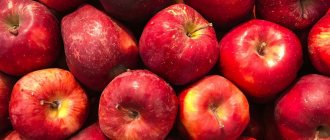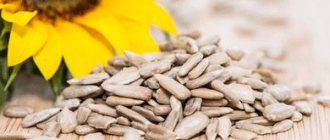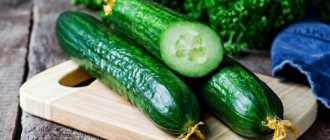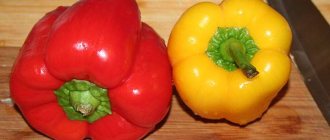There is an interesting sign in China - you cannot share pears.
And if you do share, it means that you will soon part with the person you treated. In ancient times, pears were considered gifts of the gods, as the Greeks called them. And for good reason - juicy and aromatic fruits have excellent taste, and they also contain a lot of useful substances.
Pears are suitable for snacking and preparing delicious desserts; they diversify the menu and are a table decoration. The famous gardener L.P. Simirenko described more than 1000 varieties of pears, and if we add the results of breeders to this number, there will be no end to the list. Pears for gastritis need to be chosen correctly - patients with a sick stomach are allowed only sweet fruits with juicy pulp. Other, harder types can be used after heat treatment.
Beneficial features
The calorie content of pears is low and amounts to only 46 kcal per 100 grams. This feature makes the fruit attractive to overweight patients. The fruit takes about 40 minutes to digest in the stomach, which is important for gastritis.
The fruit contains:
- arbutin is a natural antibiotic that gives the fruit bactericidal properties;
- pectins and fiber - substances necessary for digestion;
- a large list of vitamins - A, K, group B, C, E, PP, folic acid, beta - carotene;
- various macro- and microelements - potassium, selenium, calcium, nickel, manganese, sulfur, iodine, fluorine, sodium.
The aromatic fruit successfully copes with pathogenic microbes, dissolves cholesterol plaques, and participates in hematopoietic processes. Pears relieve tension and eliminate depression, remove harmful substances from the body, and have a mild diuretic effect.
Interesting! Ancient doctors recommended the fruit as a remedy for nausea. Take note of this property of the fruit, because with gastritis the symptom often occurs.
The fruits of the pear tree have astringent properties; they are indicated for normalizing intestinal function and eliminating diarrhea. This should be remembered, and if you are prone to constipation, you should still limit pears in your diet.
Is it possible to eat a pear for gastritis?
When treating gastritis, strict adherence to the diet is required, so you must understand whether you can eat pears with gastritis or not. All experts definitely agree that if the disease worsens, it is better to abandon them. These fruits are allowed to be included in the diet during the period of remission.
If the answer to the question is yes, can you eat pears, you should know how to choose the right fruit. Fruits included in the diet should be ripe and juicy. Unripe fruits increase the load on a sore stomach and can cause pain.
Advice! If you have gastritis, pears cannot be consumed on an empty stomach in any form; they should be included in the menu as a dessert after meals.
Due to the fact that this type of fruit has natural antibacterial properties, they increase the effectiveness of treating gastritis, which is caused by the pathogenic bacterium Helicobacter pylori. In addition, it has been proven that pears help cope with depression, which is often observed in people suffering from chronic gastritis.
Effect on acidity
Patients with hyperacid gastritis know that fresh fruits are not recommended for them - most of them have the ability to increase secretion. But this does not apply to pears. The fruit is one of the few allowed for high acidity. Pear lowers the acidity of gastric juice and reduces secretion.
However, some caution must be exercised in the following cases:
If the hyperacid form
If you have high acidity, pears are not forbidden to you, enjoy them to your health.
Choose fresh, soft fruits with thin skin. Such fruits do not always have a presentable appearance; they are not very large, with spots on the surface, but the taste qualities fully justify the shortcomings.
The advantage of sweet varieties is their enveloping and astringent properties, which reduce the activity of parietal cells. As a result, the acidity of gastric juice decreases.
For erosions and atrophy
Nutritionists recommend eating peeled pears for erosive and atrophic gastritis. This will help avoid traumatic effects on erosion and reduce the load on the weak mucosa during atrophy. Fresh grated pear without the skin is an excellent snack for these forms of the disease.
With normoacid form
With normal acidity, it is better to give preference to sweet and sour varieties of pears. It is recommended to eat no more than 2 large fruits per day.
Is it possible with a hypoacid appearance?
If the acidity of gastric juice is low, it is not recommended to consume fresh fruits. If the ban is violated, the acidity decreases even more, food stagnates in the stomach, and an aggravation may occur. If you really want to eat aromatic fruit, prepare a dessert or assorted fruit salad, which will include other fruits, with a lot of acid.
Contraindications
At any stage of exacerbation of gastritis, pears should be excluded from the diet in any form. This warning especially applies to raw fruits. You should not eat fruit if you have an individual intolerance, although this is extremely rare due to the hypoallergenic nature of the fruit.
You should avoid pears if you have intestinal problems, as they can cause stomach upset. Elderly people whose digestive functions are weakened due to age should be wary of including raw fruits in their diet. It is better for them to give preference to compotes and pulp from baked fruits.
Compotes, jelly, jelly
The best option for preparing fruits for gastritis is jelly. It is prepared on the basis of compote or juice, with the addition of gelatin. In this case, the traumatic effect on the mucous membrane is completely excluded.
Kissel, due to the starch it contains, is considered an almost medicinal dish for any form of gastritis. You can add pear juice to medicinal oatmeal jelly - the drink will take on a completely different taste.
It is not advisable to consume compotes with low acidity, but it is possible for other types of illness. Do not make the compote too sweet - it is better to stir a little honey in it before using.
Important! Fresh fruits should not be eaten on an empty stomach and should not be washed down with water. Due to the large amount of pectin and fiber, such a breakfast will cause flatulence. It is better to eat a pear an hour after the main meal.
How to eat pear
You need to know in what form this type of fruit is allowed to be eaten. During a period of stable remission for gastritis with high acidity, it is allowed to eat no more than one pear per day.
If after this there is discomfort in the stomach, then it is better to bake or boil the fruits. It is also allowed to include freshly squeezed pear juice in the diet. It is prepared using a juicer, has a thick consistency and a pleasant sweetish taste.
Cheese
Raw pears are allowed to be included in the diet only during the period of remission. It should be remembered that these fruits are difficult to digest, therefore, with low acidity, they can worsen the digestive process and provoke increased gas formation.
Advice! A raw pear eaten as a dessert should never be washed down with water or combined with other types of food.
Compote
Pear compote contains useful substances and can be included in the diet of a person suffering from gastritis. The drink quenches thirst well and promotes urination, which allows you to cleanse the body of harmful substances.
It can be used instead of morning tea. Compote is prepared from fresh fruits as follows:
- Three medium-sized ripe fruits are cut into pieces and the seeds are removed from the centers.
- The fruits are poured with 1.5 liters of cold water and placed on the fire.
- The compote is brought to a boil and immediately removed from the heat.
- Sugar is added to taste.
- The drink is infused for 30 minutes.
For gastritis, a decoction of dried fruits is also considered useful, which can normalize the digestion process. To prepare it, you need to pour a glass of dried fruits, half a liter of water and boil over low heat for a quarter of an hour. The drink is infused for 2 hours. After this, it is ready to eat. The dosage of such a drink should not exceed half a glass a couple of times a day after meals.
Baked
Baked fruits, which are a dietary product, are considered the most useful for gastritis. They are very easy to prepare. All you need to do is cut the washed and napkin-dried fruits in half and place them on a baking sheet lined with parchment paper. If you are not allergic, you can add a few drops of honey to each pear.
The fruits are baked for approximately 20 minutes at a temperature of 180º C. You can also bake pears in a slow cooker or microwave. To prepare a delicious puree from the pulp, it is recommended to bake pre-peeled fruits.
Dessert for everyone – “Boats”
- To prepare the pear, wash it, cut it lengthwise into 2 parts, and remove the core with a tablespoon.
- Mix cottage cheese with honey and fill the fruits with it.
- Line a baking tray with baking paper, place the pears on it and bake for 10 minutes.
This simple dish has many advantages - it does not injure the stomach and retains all the useful components. Prepare quickly. Give it a try.
Pineapple property description
Pineapple is a popular and cultivated crop around the world. When ripe, the oval or cylindrical fruits are covered with a very dense waxy shell. Depending on the variety, it can be colored in various shades of yellow, red and even green. In any case, inside there is juicy bright yellow pulp with a characteristic aroma and intense sweet taste.
The chemical composition of pineapple pulp is characterized by a high content of mono- and disaccharides, vitamins (B9, C), macro- (potassium, calcium, magnesium, sodium, phosphorus) and microelements (iron). The popularity of pineapple as a therapeutic and prophylactic agent is largely due to the presence of the enzyme bromelain in the chemical composition of the pulp. This substance has many properties in common with gastric pepsin, which is involved in the breakdown of proteins.
Pineapple is a popular and cultivated crop around the world.
Thus, consuming pineapple allows you to increase enzymatic activity, having a positive effect on the functioning of the gastrointestinal tract. In addition, these fruits will be useful for cardiovascular diseases, due to their ability to destroy blood clots in blood vessels, and also normalize insulin levels in the blood.
Eating pineapple increases the level of serotonin in the blood, a hormone that dulls the feeling of hunger. In turn, manganese, also included in the chemical composition of the pulp, stimulates the metabolism of proteins and carbohydrates. And, of course, one cannot fail to note the beneficial effects of ascorbic acid, contained in pineapple in fairly large quantities. Thanks to this, this fruit will be effective in the treatment of various colds, having an immunostimulating, tonic, anti-inflammatory and bactericidal effect on the body.
Properties of pineapple for the gastrointestinal tract
The fiber contained in pineapple improves the functioning of the digestive system, cleanses the body of toxins and excess cholesterol, and gives a feeling of fullness (a small piece of pineapple will muffle feelings of hunger). Fiber improves intestinal motility and eliminates constipation. Pineapple is useful for gastritis with low acidity.
Pineapple contains bromelain. After a heavy lunch or dinner, when you feel heaviness in your stomach, instead of Mezim or Pancreatin, you can eat a piece of pineapple or drink a little juice, the effect will be the same. Bromelain will increase gastric enzymatic activity, break down protein foods, which will facilitate its digestion and absorption.
Pineapple has a pronounced but mild laxative effect. This refers specifically to the fruit itself; it can be eaten fresh, canned, dried or cooked. Pineapple acts very gently, but comprehensively. Fiber is essential for a good and comfortable trip to the toilet. Stimulation of digestion relieves stagnant effects and activates peristalsis. All this leads to a serious mitigation and improvement in the quality of toilet visits.











